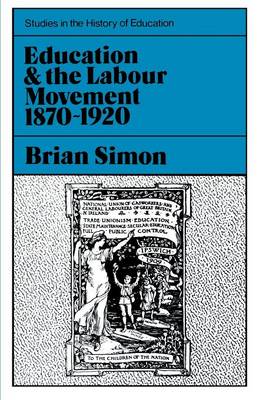Study in History of Education
3 total works
Vol 3
The third volume of the "Studies in the History of Education", this book covers the crucial years 1920-1940, in which the ground was prepared for the 1944 Education Act and, likewise, for most of the conflicts which have beset educational policies in Britain since the end of World War II. In this period, Labour's programmes for educational reform came into conflict with a dwetermined Conservative resistance, and proposed reforms were repeatedly cut back by the call for economies, starting with the "Geddes axe" in 1921-22. At the same time, real power in the shaping of educational policies passed more and more into the hands of the permanent officials, the top civil service administrators of the Board of Education. The long-established divided system of education was consolidated by the development by pschologists of the theory and practice of "psychometry" and "intelligence tests", while the privileged position of the public schools, already under challenge, was maintained intact.
The first of three studies in the "History of Education in England", this volume traces the emergence of modern education from the efforts of the scientific societies in the 1780s up to the securing of universal education with the Act of 1870. The ideas for model schools by such reformers as James Stuart Mill and Jeremy Bentham are expounded in detail, together with the early attempts at working people's self-education, the struggle for leadership of the Mechanic's Institutes and Robert Owen's movement for communal education. Reform of the universities and grammar schools is shown as part of the changeover of political power from the landed aristocracy to the industrial middle class. The Chartists are seen striving for working-class education, and the power of the trade unions finally enters to carry through the 1870 Act. This was a century during which the division of England into "two nations" became most clearly marked, and the structure of education for the different classes was determined.
Vol 2
The second of four studies in the "History of Education in England," this volume traces developments from the securing of universal education with the Act of 1870 to the conclusion of the First World War. These educational developments were marked by the increasing role played by organised Labour in pressing for reform of the system of universal education - opposing class privilege and prejudice, and urging equal opportunities for all. With the formation of the Public Schools, and then with the defeat of the School Boards which were trying to improve the opportunities for working class children, a divided system of education became well established, in which the few were trained for university entrance and then for the top jobs, while the mass were denied any but an "elementary" education. While Labour opposition to this division was unsuccessful, many vital concessions were won in those years, such as the abolition of school fees and the provision of school meals. Very interesting chapters are devoted to the effects of imperialist expansion on educational ideas, and to the developments and conflicts in adult education.

